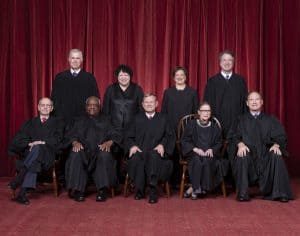The enumeration in the Constitution of certain rights shall not be construed to deny or disparage others retained by the people.
—United States Constitution, Ninth Amendment—
For those unfamiliar with the Ninth Amendment, and that includes most average Americans, it essentially enshrines respect for the tenets of historic English common law into the U.S. Constitution. Adam MacLeod, a law professor, describes common law as “(rights that) have existed in our legal tradition from the time immemorial.” David Fowler, president of Family Action Council of Tennessee, has described it as “the absolute … right to life, liberty and property.”
—Brittany Raymer, reporting for The Daily Citizen—
Key point: A flawed interpretation of the Fourteenth Amendment led to Roe vs. Wade and Doe vs. Bolton. Decades later, a well crafted pro-life law in Tennessee based on the Ninth Amendment may hold the key to bringing down that flawed interpretation and the abortion-related rulings that flowed from it.

On July 21, 2019, I released an article titled “Eight Things You Need to Know About the Heartbeat Bill Movement.” The article celebrated the then-recent success enjoyed by pro-life citizens in Ohio, who worked tirelessly to get a heartbeat bill passed. It was signed into law by Governor Mike DeWine on Thursday, April 11, 2019. It is encouraging that efforts to pass heartbeat bills in numerous states have coalesced into a movement to end abortion altogether. At the time the article was published, I released this summary of efforts that were underway in numerous states to enact abortion restrictions based on the detection of a fetal heartbeat.
Heartbeat Bills: A Mixed Track Record
Here is a more up-to-date chart. As you can see, federal courts have prevented all of the heartbeat bills that have been signed into law from taking effect. In other situations, bills were introduced but never became law because of various legislative hurdles and roadblocks. Reporting for CNN, Jessica Ravitz writes that
just as often as they are introduced, these bills get stymied. They are held up in committees, rejected in legislative votes, vetoed by governors and struck down in courts. Not one state has managed to put a heartbeat bill into lasting practice.
In Tennessee, what frequently was referred to as a heartbeat bill hit a significant obstacle in 2019. HB77

passed the Tennessee House of Representatives on Thursday, March 7, 2019 by a vote of 65 to 21. The bill was championed in the Senate by Senator Mark Pody of Lebanon, who worked tirelessly for its passage. Nevertheless, on Tuesday, April 9, the Senate Judiciary Committee sent the senate version of the bill [SB1236] to a summer study committee. This put the legislation on hold.
The Judiciary Committee held a 2-day hearing on the bill on on Monday and Tuesday, August 12 and 13, 2019. I’ll refer to testimony from that hearing in just a bit.
We rejoice over all the efforts to pass legislation that restricts abortion, especially with regard to the successes we have seen, however short-lived. And while it’s disappointing to see a pro-life effort blocked, the possibility remains that these efforts may yet bear positive fruit. Even so, we have to acknowledge that a downside exists—one we haven’t yet mentioned. Brittany Raymer, the pro-family reporter we quoted at the top of this article, explains that while most heartbeat bills vary in some respects, they generally ban abortion from the time a heartbeat initially is detected, usually at about six weeks. Once they are signed into law, these provisions immediately are challenged in court on the basis of their supposedly having violated the 14th Amendment, the Amendment that was cited as part of the legal underpinning of Roe vs. Wade and Doe vs. Bolton.1 Raymer continues, saying that when heartbeat laws are overturned,
pro-life states end up having to pay their own attorney fees along with fees of legal challengers like Planned Parenthood and the American Civil Liberties Union. Depending on how far the litigation goes, the bill could be in the millions of dollars.
A New Approach
This is where the Ninth Amendment comes in. In Tennessee, the Senate Judiciary Committee’s summer study of SB1236 quickly began to focus on an amendment that would link the proposed legislation to the Ninth Amendment to the US Constitution—even to the point of making it appropriate to no longer refer it as a “heartbeat bill.” Assuming the proposed amendment to SB1236 were adopted, it then could be called a “Ninth Amendment bill.” The Ninth Amendment reads as follows.
The enumeration in the Constitution of certain rights shall not be construed to deny or disparage others retained by the people.
Crafting a bill that restricts abortion based on the Ninth Amendment has merit for several reasons.
First, this approach is promising. The Ninth Amendment emphasizes that the rights explicitly cited in the previous eight constitutional amendments, and, subsequently, those that would be cited in later amendments, aren’t the only rights the people enjoy. Moreover, it affirms that the Constitution’s citation of specific rights can’t be interpreted to restrict, “deny or disparage” those rights that aren’t named. According to an article at Revolutionary War and Beyond,

The Founding Fathers realized that they could not possibly list every natural right of human beings that needed protection. Instead, they delegated certain powers to the government that were specifically spelled out in the Constitution, and said everything else is left up to individuals and to their state governments.
What is a natural right? Natural rights are those rights that people have just because they are human. They are natural to mankind and should not be violated by the government. So, things like freedom of speech, freedom of religion [both of which are cited in the First Amendment] and freedom from cruel and unusual punishment [cited in the Eighth Amendment], were judged by the Founding Fathers, to be natural rights that the government can not violate.
But what about the right to privacy? someone may ask. Can’t pro-abortion advocates make the case that the Ninth Amendment protects the right to privacy, an idea that has been used as a rationale to make abortion constitutional? This is a great question! Hold that thought in your mind; we’ll explore it momentarily.
Second, the Ninth Amendment has been called the “neglected” and “forgotten” amendment (also go here). That makes this approach unique. It hasn’t yet been tried, so the courts would have a new legal foundation to review. They would not be able to dismiss such a law in a scenario we might informally describe as “the same song, but a different verse.” According to the Family Action Council of Tennessee, “The Supreme Court to date has never been in a position to reconcile the rights of “persons” in both the 9th and 14th Amendments.” They’ve only been led to address the issue with regard to the 14th Amendment.
Third, the approach is substantive. It carries legal weight. The unenumerated rights to which the Ninth Amendment alludes aren’t just any “rights” the people may dream up, or believe to be theirs based on urges, desires, wishes, or whims. They are not arbitrary. Rather, those rights are upheld in common law (also go here, and here). By crafting a pro-life bill based on the Ninth Amendment and putting it into law, the state of Tennessee can force the courts, including the Supreme Court,
-
-
- to seriously consider the validity and meaning of the Ninth Amendment and, in light of it,
- to examine closely its interpretation of the Fourteenth Amendment as a rationale for striking down states’ restrictions on abortions.
-
Especially since we now have five justices who believe it is right to interpret the Constitution according to the intentions of those who drafted it, this is a winning strategy for the pro-life movement.

The Ninth Amendment and its Ties to Rights Recognized in Common Law, Including the Right to Life
Family Action Council of Tennessee President David Fowler writes,

As to these “other rights” [highlighted in the Ninth Amendment], the testimony [at the summer study for SB1236] was that the Court has a long history of defining and understanding words in the U.S. Constitution by looking to their meaning at common law. Professor [Adam] MacLeod’s un-rebutted testimony [available here] was that the common law provided the “lexicon” by which the words and phrases in the U.S. Constitution would have been understood..…
When it comes to the common law and common law rights, the U.S. Supreme Court has consistently looked to William Blackstone’s Commentaries on the Law of England for understanding, even to the present day. In his Commentaries, Blackstone defined common law as “leges non script [literally, “unwritten laws”], because their original institution and authority are not set down in writing, as acts of parliament are, but they receive their binding power, and the force of laws, by long and immemorial usage, and by their universal reception throughout the kingdom.”

In other words, common law precedes and exists apart from any positively enacted laws, whether they are “enacted” as part of a written constitution or by a legislative body. And protecting or securing our common law “rights” was said to be the first duty of civil government.
Fowler goes on to demonstrate that William Blackstone saw life, even life in the womb, as one of those rights:
And “life,” said Blackstone, “begins in contemplation of law as soon as an infant is able to stir in the mother’s womb. . . . An infant in ventre sa mere, or in the mother’s womb, is supposed in law to be born for many purposes.” Of course, in thinking about this rather crude understanding of when law attaches to life, one needs to keep in mind that the modern understanding of conception and the beginning of life at conception was not known until the 1800s, years after Blackstone (and those before him) wrote that statement.
Do you see the connection here—and the potential path to a court victory in favor of life?
At the same 2-day hearing at which Professor MacLeod testified, David Fowler offered testimony as well. He essentially admitted that without the Ninth Amendment as a legal foundation, bills commonly referred to as “heartbeat bills” actually set an arbitrary standard for regulating abortion.
Basing the potential for the unborn “becoming” a constitutionally recognizable person based on the odds of surviving outside the womb [and thus hopefully being legally protected from being aborted] is arbitrary. But basing an abortion ban on when fetal pain is felt or a heartbeat is detected is no less arbitrary. Arbitrary is arbitrary, and arbitrary is the antithetical to the rule of law. I don’t care about the optics of bumper sticker politics or jurisprudence—abortion stops a beating heart—but [I care deeply about] the rule of law.

He also said the Senate version of the Tennessee heartbeat bill (SB1236) — and by this he meant the bill as it would be amended — “lays a Ninth Amendment axe to the…constitutionally diseased roots of the Court’s 14th amendment abortion jurisprudence. It is time to cut Roe down.”
An Important Update
Since the Senate Judiciary Committee met in its 2-day summer study of SB1236, a new bill has been drafted called the “Rule of Law Life Act.” You can access the bill here. David Fowler writes about it here, in an article we’ve already cited several times in this post. In the Tennessee House of Representatives, the Rule of Law Life Act is HB1962 and is sponsored by Representative Dan Howell of Georgetown; and in the Tennessee Senate it is SB1780, sponsored by Senator Janice Bowling of Tullahoma.
To date, the Rule of Law Life Act (SB1780/HB1962) is the only bill before the Tennessee Legislature that would restrict abortion based on the Ninth Amendment. If SB1236 were amended to do so, the amendment certainly would improve the bill substantially. In fact, SB1780/HB1962 can be added as an amendment to SB1236. (Go here to review several whereas clauses in the new bill that affirm the Ninth Amendment, the common law to which it points, and consequently, the right to life.)
While Governor Lee has promised “enhanced” and “comprehensive” pro-life legislation, his proposal has not yet been submitted to the legislature for consideration. At this point, it is uncertain whether or not it will rest on the Ninth Amendment. Also, SB1236 has not yet been amended to include an affirmation of the Ninth Amendment. As we have said, were it to be amended as proposed, it would become a stronger bill, and the Rule of Law Life Act can be added to it to strengthen it. Were that to happen, it then shouldn’t be referred to as a “heartbeat” bill, but a Ninth Amendment bill.
So, as the legislative process in Tennessee unfolds in the first half of 2020, remember these important points. A pro-life bill that rests solidly on the Ninth Amendment to the US Constitution is much more likely to be successful in achieving what all genuine pro-life individuals want: an end to the federal ruling that prohibits states from ending abortion altogether. Tennessee has the opportunity to pass such a bill this year. If pro-life citizens get involved and contend for a substantive bill like the Rule of Law Life Act, they can make a huge positive difference in their own state and in the nation.
A pro-life bill that rests solidly on the Ninth Amendment to the US Constitution is much more likely to be successful in achieving what all genuine pro-life individuals want: an end to the federal ruling that prohibits states from ending abortion altogether. The Rule of Law Life Act is such a bill.
Once this is achieved, we’ll still have a great deal of work left to do. Yet, a great deal already will have been accomplished.
May God grant us His favor and bless us as we seek to protect the life of every person from conception to natural death.
Update: Added Thursday, February 6, 2020
SB2069 (Pody) and HB2296 (VanHuss) are Senate and House versions of pro-life bills that have nothing to do with abortion but still would strengthen Tennessee’s legal underpinnings for defending life. According to the website of the Tennessee legislature (at the links cited above), this bill
authorizes local governments to take special censuses that include unborn children; requires that any state funds distributed and allocated to local governments based on population use such special census figures. – Amends TCA Title 2; Title 4; Title 5; Title 6; Title 7; Title 8; Title 9; Title 16; Title 54; Title 57 and Title 67.
Copyright © 2020 by B. Nathaniel Sullivan. All rights reserved.
Notes:
*— Own work — (For more information, go here and here.)
1The courts actually have no authority to consider the constitutionality of state prohibitions of abortion, but we’ll have to postpone that discussion for a later date.
Copyright © 2020 by B. Nathaniel Sullivan. All Rights Reserved.

The difficulty with employing such a law — and an argument in favor of the heartbeat bills — is that the issue in Roe v. Wade never was with the absence of a right to life, per se. The issue was a question of personhood.
The justices in that decision acknowledged that the right to privacy has to be balanced against other rights, and other interests of the state (for instance, protecting its citizens), but that the personhood of an unborn child could not be determined. (That’s all my paraphrasing, because it’s been a while since I read the actual language.)
So if we can adequately demonstrate that an unborn child is arguably a “person,” for purposes of law, Roe v. Wade should overturn itself (so to speak).
Thank you, Rachel, for reading and for your comment. Despite the fact numerous heartbeat bills have been struck down, a major proponent of them, Janet Porter of Ohio, still is optimistic they’ll be a very effective weapon against Roe v. Wade at the Supreme Court. I’m not a lawyer, but I also see hope in linking a pro-life bill to the Ninth Amendment, for the various reasons the article highlights. Let’s pray for both approaches! Thanks again for your comment. —B. Nathaniel Sullivan